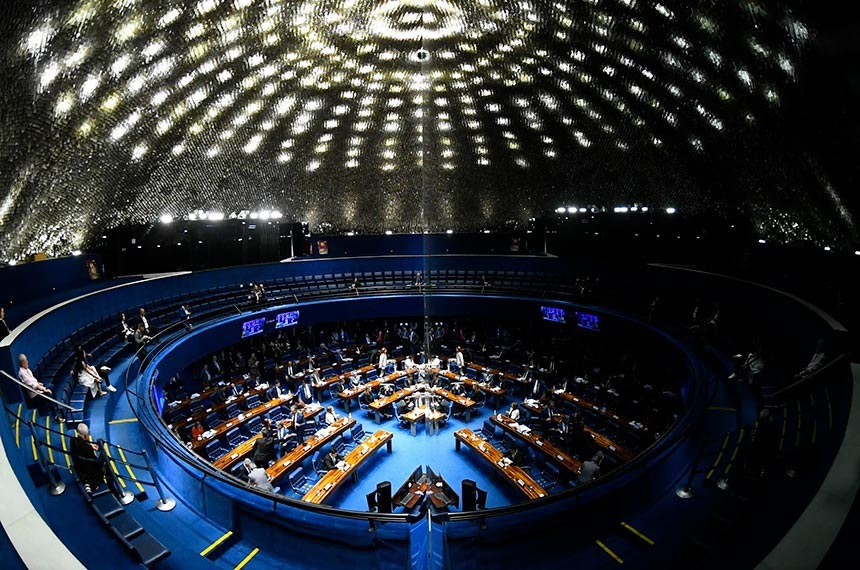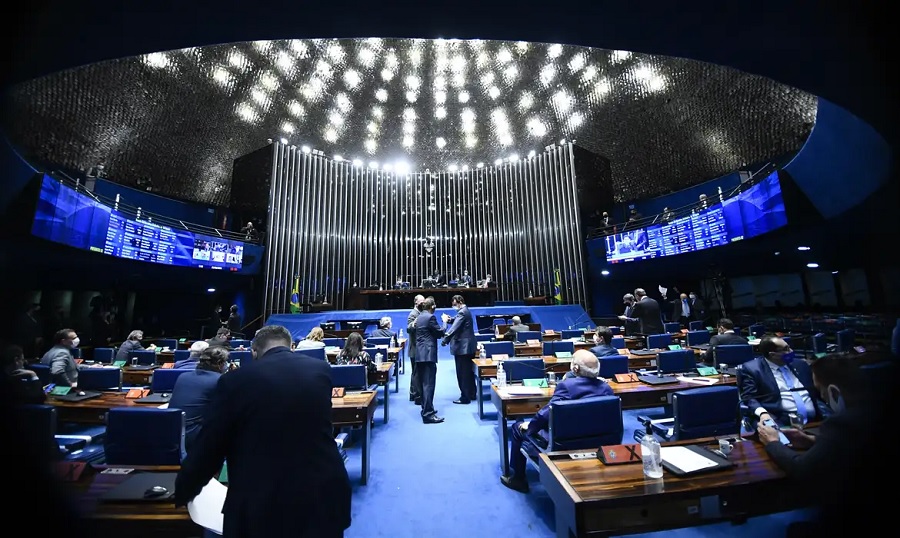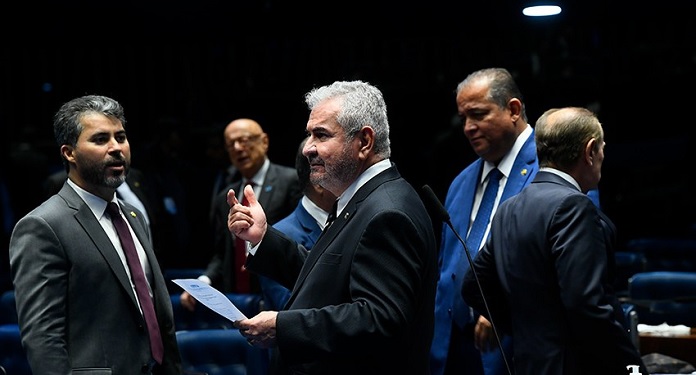The Senate Plenary approved this Tuesday, 12th, the basic text of the bill that provides for the regulation of fixed-odd sports betting, known as bets.
PL 3,626/2023, from the Executive Branch, was approved in the form of the report by senator Angelo Coronel (PSD-BA). Modified in the Senate, the text will return to the Chamber of Deputies for analysis.
The base text was approved in a symbolic vote, with many opposition votes, and three highlights were considered, of which two were approved.
With 37 votes in favor and 27 against, the senators included an amendment by Carlos Portinho (PL-RJ) that limits the scope of the project to games based on real events, excluding online casino games.
An amendment by Senator Tereza Cristina (PP-MS) was also accepted (with 45 votes in favor and 23 against), which excludes the installation of physical machines from the project.
By 36 votes in favor and 25 against, the senators decided to maintain the advertising of betting houses in sports arenas and the sponsorship of gambling houses for athletes.
When discussing the matter, Rogério Carvalho (PT-SE) recalled that Brazil is already the second largest gaming market in the world.
“There are people who don’t want regulation, and are exploiting games. You don’t want them to regulate because their gain is much greater. Because they don’t distribute any type of profit with the government”, he said.
Fixed odds sports betting
The text amends the law that provides for the free distribution of prizes for the purpose of advertising (Law 5,768, of 1971) and the law that deals with the allocation of lottery revenue and the lottery modality of fixed-odd bets (Law 13,756, of 2018 ).
After all, the fixed-odd betting lottery is a betting system that includes virtual online gaming events and real sports-themed events.
In this modality, the bettor will win if they match any condition of the game or the final result of the match.
The project establishes the taxation of betting company operators and winning bettors.
Law 13,756, of 2018, which created this type of lottery, provided that companies would keep 95% of gross revenue (after payment of prizes and income tax), while the project allows 88%.
The text also defines that operators must pay a grant of up to R$30 million for operating betting.
According to the sports betting regulation project, fantasy sport, an electronic sport in which disputes take place in a virtual environment, based on the performance of real people, does not constitute the exploitation of a lottery modality.
Thus, the modality is exempt from authorization from public authorities.
Tax
Of the amount collected, 2% will go to social security. Other recipients of the resources will be the areas of sport (6.63%) and tourism (5%).
In sport, the amounts will be divided between the Ministry of Sport (4%), athletes (1.13%) and specific sports confederations, with percentages varying between 0.05% and 0.4%.
Half a percent of the amount will be directed to state sports departments, which will have to distribute half to municipal sports departments, proportionally to the city’s population.
In tourism, 4% will be allocated to the Ministry of Tourism and 1% will go to Embratur.
Still according to the proposal, education will receive 1.82% of what is collected. Within this amount, 0.82% will be allocated to preschools or primary and secondary schools that have achieved targets for national assessment results.
The remainder (1%) will go to public secondary technical schools.

Authorization to operate sportbooks.
The future standard will require authorization by the Ministry of Finance, with a term of up to five years and may be revised at any time.
Legal entities must meet several requirements, such as having headquarters and administration in the national territory, having at least one member of the control group with proven knowledge and experience in games, betting or lotteries, and meeting technical and cybersecurity requirements.
The administrative authorization procedure will be processed electronically, and, during its analysis, access will be restricted only to the interested party and whoever represents him.
The authorization will only be issued if, after examining the documentation and evaluating the company’s technical and financial capacity and the reputation and knowledge of its controllers and administrators, the Ministry of Finance concludes that all legal and regulatory requirements have been met.
A fixed amount of consideration will also be collected, stipulated in regulation (limited to R$30 million).
Regulation of sports betting and advertising
The electronic channels used by the operating agent must clearly display data such as the number and date of publication of the authorization ordinance, physical address of its headquarters, contact details for customer service and ombudsman.
Furthermore, communication and advertising actions for the betting lottery, carried out by operating agents, must include warnings discouraging gambling and warnings about its harm, in addition to observing restrictions on broadcast times and channels.
Therefore, advertisements that present the bet as socially attractive or contain statements from well-known personalities that suggest that the game contributes to social or personal success will be prohibited.
Furthermore, the dissemination of unfounded statements about the probabilities of winning, or that give rise to the understanding that betting may constitute an alternative to employment, a solution to financial problems or a form of financial investment, will be prohibited.
While the text also prohibits the operating agent from acquiring rights to sporting events for any form of display of sounds and images.
Combat manipulation of results
Sports events subject to fixed-odd betting will feature actions to mitigate match-fixing and corruption in live events, with bets proven to be made through match-fixing and corruption being void.
Bettors’ resources cannot be pledged to guarantee debts assumed by the betting operating company and the operating agent must adopt identification procedures that allow the validity of the bettors’ identity to be verified.
Prohibited from betting
Minors, people with significant influence or employees of the betting operating company, as well as public agents with duties directly related to the regulation and supervision of the activity, will be prevented from betting.
The list also includes anyone who has or may have access to the bet’s computerized lottery systems, and anyone who has or may have influence on the outcome of the lottery event, such as athletes and other participants.
Penalties
While infractions will be investigated through an administrative process, with penalties for operating agents who violate legal and regulatory rules, which range from warnings to fines of up to 20% of the proceeds collected.
According to the text, the fine cannot be less than the advantage obtained by the offender nor more than R$2 billion per infraction.
Among the penalties imposed, there may be partial or total suspension of activities for up to 180 days, revocation of authorization, prohibition of obtaining new authorization for up to 10 years, as well as prohibition of participating in bidding for a period of no less than 5 years, and disqualification from acting as a director of a company that operates any lottery modality for up to 20 years.
In the case of other individuals or legal entities governed by public or private law, when it is not possible to use the criterion of the revenue collected in the case of fines, these may vary from 50 thousand reais to 2 billion reais per infraction.

Physical machines
In defense of his report, Angelo Coronel criticized colleagues who try to “shape” public opinion against a project beneficial to Brazil.
“They’ve been saying that there will be casinos in bakeries, in stores, in bars. This is a fallacy. There is nothing like this about machines installed in physical places. Anyone who wants to play will be sure to pick up their cell phone from the comfort of their home.”
Girão, in turn, defended Tereza Cristina’s prominence, which excludes the possibility of physical machines.
According to him, the base text would effectively open a loophole for the installation of electronic devices in commercial establishments. Portinho maintained that the installation of physical machines would lead to a public security problem surrounding the territorial dispute.
Regulation of sports betting and online casinos
Carlos Portinho highlighted that the highlight restores the position of the original provisional measure, which excluded casino games — which, according to him, could be dealt with in another project.
Furthermore, he protested against the inclusion of online games in the text, remembering that in real games the profit margin is smaller.
Angelo Coronel, however, argued that regulation will provide means of supervision and control for a practice that already exists.
Subsequently, Kajuru assessed that the approval of the highlight would demoralize the Senate, as he considers it certain that, in defense of revenue, the government will make an agreement to overturn the item when the project is re-examined by the Chamber.
“That’s what’s going to happen. We, senators, wear the shirt of idiots for the country”, declared the senator after the approval of the regulation of sports betting, but without online casinos.




















































